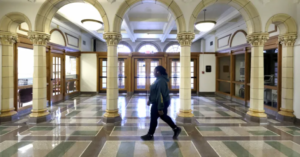Changes steer audit of Colorado accountability system away from looking for bias in state tests
4 min read
A bill ordering a wide-ranging performance audit of Colorado’s school accountability system has passed the Senate after skeptics amended the bill to focus more on narrowing persistent gaps in test scores and less on determining if the tests are biased.
The amendment was one of several changes the bill has undergone to rein in an audit some feared would be too slanted against the accountability system Colorado has used to monitor schools since 2009.
“Where this bill started was an attack on assessments, and where it is now is looking at changing our accountability system so that it’s working for our kids,” said state Sen. Jeff Bridges of Greenwood Village, who brought the amendment on the Senate floor Thursday with support from state Sen. Janet Buckner of Aurora.
House Bill 1294 orders an independent third-party review of Colorado’s school accountability system, which rates schools based on standardized test scores and allows for outside intervention in schools that don’t improve. The audit would ask whether the system meets the goals laid out by legislators, improves student outcomes, hurts certain student groups, and influences teaching practices in negative ways, among other questions. The audit would be due in November 2022.
The bill is a top priority for the Colorado Association of School Executives, which represents superintendents and other administrators. Many of them feel the current system judges schools unfairly and doesn’t provide the type of information that actually drives improvement.
Teachers and community groups also support the bill because they worry the system currently penalizes schools serving low-income children of color and overemphasizes test scores at the cost of a rich academic experience.
But some Democrats on the Senate Education Committee feared the original audit bill set up a foregone conclusion: that state assessments themselves are biased.
The bill rests on a fault line among Democrats who control the state legislature. The party once championed education reform, including using standardized tests to measure the performance of districts, schools, and teachers. Now the party is divided, with some who once supported these policies questioning whether they’ve been effective.
When the bill was first heard in the House Education Committee, representatives of education advocacy groups like Democrats for Education Reform and the Colorado Children’s Campaign said they had concerns that the bill didn’t ask the right questions and would lead to faulty conclusions.
Those groups dropped their opposition after the wording of one of the questions was changed in the House. Instead of asking the auditor to examine whether aspects of the accountability system “maintain institutional or cultural biases,” the bill now asks the auditor to consider whether “unintended barriers or obstacles” affect the performance of students from different groups.
The change shifted the focus from bias in the accountability system to the myriad challenges students face in and out of the classroom. The change also garnered Gov. Jared Polis’ support — but not that of all Senate Democrats.
It took a week to hammer out an amendment that addresses those concerns while maintaining the support of bill sponsor state Sen. Robert Rodriguez of Denver. Most Republicans remained opposed to the bill, though they said the amendment improves it.
The House still needs to approve the Senate amendment before the bill goes to the governor.
The Senate amendment doesn’t change the questions the independent auditor would consider. Instead, it changes the legislative declaration, a statement of intent that sets the direction of the audit.
The change to the legislative declaration describes Colorado’s test score gaps. In the 2018-19 school year, the most recent for which test data is available, roughly 30% of Black and Latino students performed at grade level in literacy, compared with 45% of all students. In math, 13% of Black and Latino students performed at grade level, compared with 35% of all students.
Similar gaps exist across the nation. Experts disagree on how much those differences are caused by the quality of education in schools serving low-income students of color, the effects of poverty and racism outside the classroom, and bias embedded in the tests.
The amendment goes on to note that there are schools and districts where low-income students of color buck these trends and post high test scores. It also calls out the opportunity gaps that shape academic performance: lack of access to preschool and advanced coursework, inadequate wraparound services, less experienced teachers, and harsher discipline.
Bridges said the audit may find that the accountability system doesn’t do enough to address the most important factors in student achievement or even that the system makes things worse. The system may need to change, Bridges said, but he doesn’t want the auditor to see test score gaps and conclude that the assessments are the problem.
“We know we have a long way to go to get our kids where they need to be,” Buckner said in support of the amendment. “I admire the fact that we are able to have these conversations. They are not the easiest conversations to have because we disagree about what we should be doing for our kids, especially for our kids of color.”
This article was originally posted on Changes steer audit of Colorado accountability system away from looking for bias in state tests







